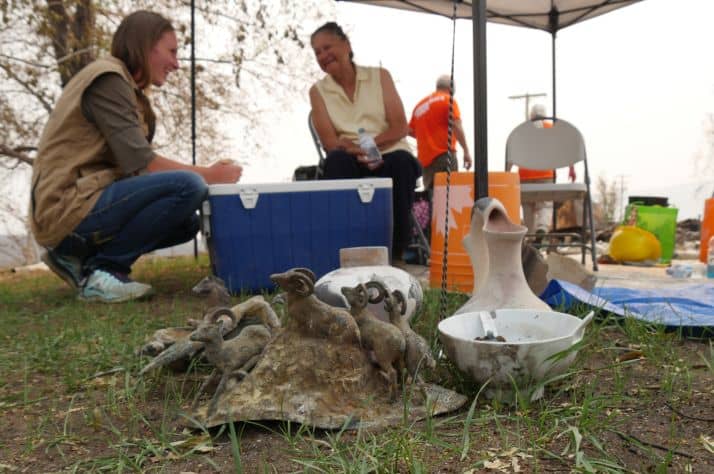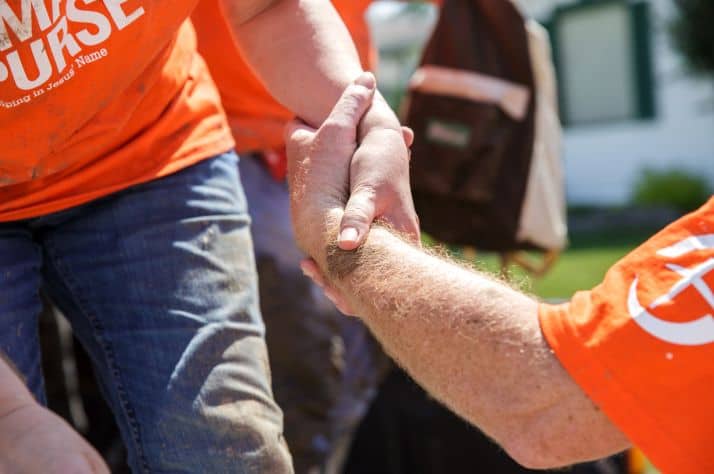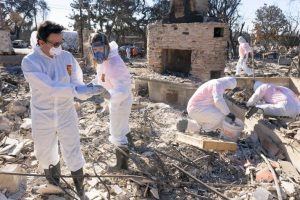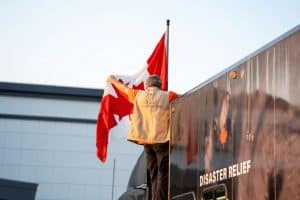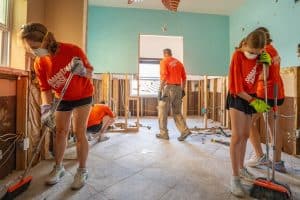A dispatch from the front lines of our wildfire response in British Columbia
By Shannon Smith, Samaritan’s Purse information coordinator
Someone’s cell phone alarm sounds at 6 a.m. and two of the four cots in the little children’s ministry room in the Sage Hills Community Church basement are already empty.
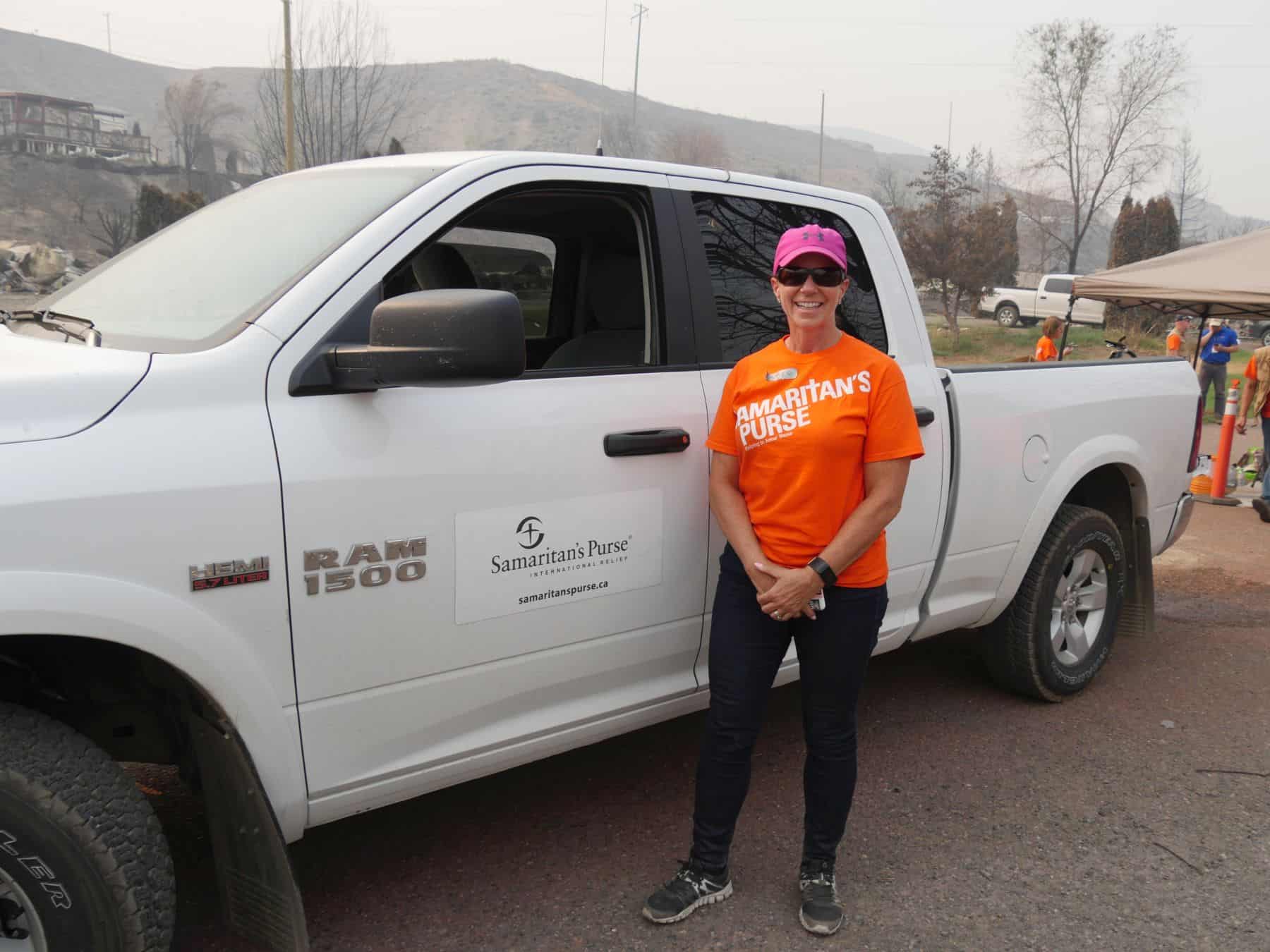
Tracey, the volunteer who transports homeowners to and from the fire site, and Melissa, the Samaritan’s Purse summer intern who helps volunteers sift through the ashes of burned homes, have already hit the shower trailer in the church parking lot. Now the pair is making toast in the common area of the church basement as the male volunteers start to file in from the sanctuary upstairs where the men’s sleeping quarters are set up.
“First we drink the coffee, then we do the things!” quips one of the two Billy Graham Evangelistic Association Rapid Response Team chaplains on-site.
We share some jokes about who gets the Tim Horton’s coffee pods and who gets the generic ones before diving into our hard-boiled eggs and cereal that a Samaritan’s Purse Canada site leadership team member has already set out for us.
At 7 a.m., a chaplain stands and gently shushes the gathering of about 20 to begin the morning’s devotional.
This morning we read from 1 Kings and then gather to pray for the day, the volunteers, the homeowners, the church that is hosting us and the first responders continuing to battle the hundreds of blazes that burn around us in the province of B.C.
The melting point
A quick glimpse outside shows the smoky haze is heavy today and a fine layer of ash covers the SPC Disaster Relief Unit, the BGEAC Mobile Ministry Center and the rental vehicles parked neatly in the church lot overlooking the desert landscape in this beautiful section of south central B.C. Yesterday, you could see the hills. Today you cannot. A woman from a neighboring home walking her German shepherd in the empty lot behind the church barely becomes visible until she is within 20 feet of us.
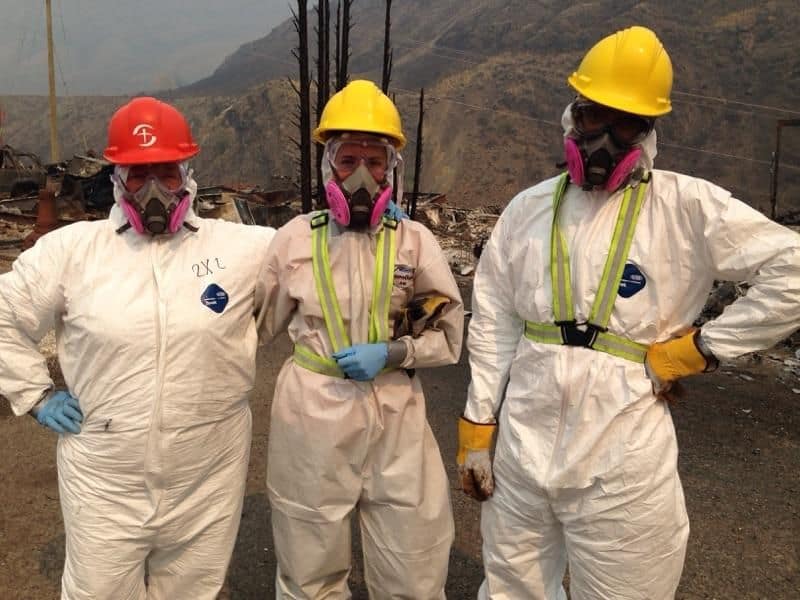
We linger in the church parking lot for a few minutes speculating about just how warm it is going to get today. It’s forecast to reach 41, but we sure hope they’re wrong.
Sifting is hot, messy work that can be dangerous without the proper personal protective equipment (PPE) which includes custom-fit breathing masks, goggles and Tyvek hazmat suits. Suited-up, volunteers look like they have stepped out of a sci-fi movie. Most people wear thick headbands to try and keep the sweat from trickling into their eyes and impairing their vision.
As teams of four to six volunteers receive their work orders for the day, they head out to the rental trucks to begin the day’s work. No one knows what will happen, but everyone is content it is in God’s hands. These volunteers are well-trained and incredibly eager to work. The RRT chaplains have ensured they are spiritually fed and well-prayed for.
On-site, the drive down into the Boston Flats trailer community where 47 of the 51 homes were completely destroyed is sobering. Samaritan’s Purse is overseeing all the sifting efforts at this site.
The colorless swath of land defies description. Just weeks ago, carefully tended rose beds brought bursts of color to the community, and hand-sewn, brightly patterned curtains fluttered at kitchen windows. Neighbors stood in driveways and backyards and chatted about truck repairs, hockey scores and the best time to buy pastries at the local bakery. Now all is shades of grey.
Read how Samaritan’s Purse volunteers bring help and hope to BC wildfire victims
Promptings from God
As homeowners are driven down onto the site by Tracey, they get a first glimpse of the destruction.
Tracey always takes a minute near the top of the hill to let them take it in. At these times, she pays close attention to the promptings of God on her heart.

Should she extend a hand? Offer a shoulder? Provide silence? Words of reassurance? Every instance requires a different response, and Tracey has become very adept at obeying God’s leading in this. Time after time, homeowners express appreciation for her sensitivity.
“I have never felt more like I am exactly where I am supposed to be than I have this week,” she tells her fellow volunteers that evening. “I can’t even explain the peace doing this has brought to my life. I feel like I am at the center of God’s will.”
Our volunteers are an exceptionally diverse lot—a personal fitness trainer, a graduate student, a tree planter from Ireland, a South African pastor, a real estate manager, a heavy equipment operator, the list goes on and on.
Down on site, the volunteers take 15-minute shifts sifting through the ash as home-owners stand at a safe distance, but close enough to provide direction.
“That used to be the kitchen over there, and my grandma’s teapot sat on the windowsill. There were some silver coins inside it. Can you check and see if they’re there please?”
“I had some heavy-duty towing chains out back by the shed. Can you see if they made it?”
“My granddaughter painted a stone for me that she found down by the river when she was five. I kept it by my night table. She died in a car crash last summer. Can you see if…”
Discovering the good in the midst of loss
Some homeowners are stoic. Some are trembling. Some are angry. Most are shockingly poised.
There are moments of great joy too.

Melissa, the summer intern, sticks the shovel in the charred ground and comes up with a payload of old silver coins.
Everyone celebrates. Volunteers quickly kneel down and begin rinsing the coins.
Every victory, no matter how small, is to be celebrated here. We thank God. It’s how we persevere—the volunteers and the homeowners alike.
After a sifting is completed, the homeowners are asked if they would accept a signed Bible. Most say yes. In the Bible, volunteers write personalized messages of hope, encouragement and love.
Often, we pray together after. We pray for God’s peace and love. We pray for healing in the past and hope for the future. We ask God for help. And we thank Him that He’s with us.
Finding what matters
A few miles to the south, another team completes a sifting in a First Nations community. Ruth and Les not only lost their home, but also Ruth’s handicraft shop where she sold the treasures she spent months creating.
Volunteers sit with Ruth as she shares her story. This fire is bringing up memories of another fire she once endured as a teenager.

She tells us about the good times and bad times and everything in between raising her kids as a single mom. Her gentleness and soft-spoken wisdom draws people to her, and time passes quickly as she shares her life with us.
Her husband is talking shop with one of the male site team leaders off in the distance, and Ruth steals glances at some of the items volunteer sifters are uncovering.
They find some pottery pieces, bronze art, pearls, and a beloved belt buckle from Ruth’s days as a barrel racer. She lost much, but she is deeply appreciative of what remains. The joy in her face in the photographs that we take, with her permission, is remarkable.
Back at Boston Flats, sifters are working to recover an 89-year-old home-owner’s possessions. There is so little left.
But Marianne, a property manager at Boston Flats who lost her home and yet has volunteered all week to help sift through the ashes of other’s homes alongside her husband Don, let’s out a joyful shout.
“Doug’s garlic! It’s still good! We have to dig it up. He’s going to be tickled.”
And indeed he is.
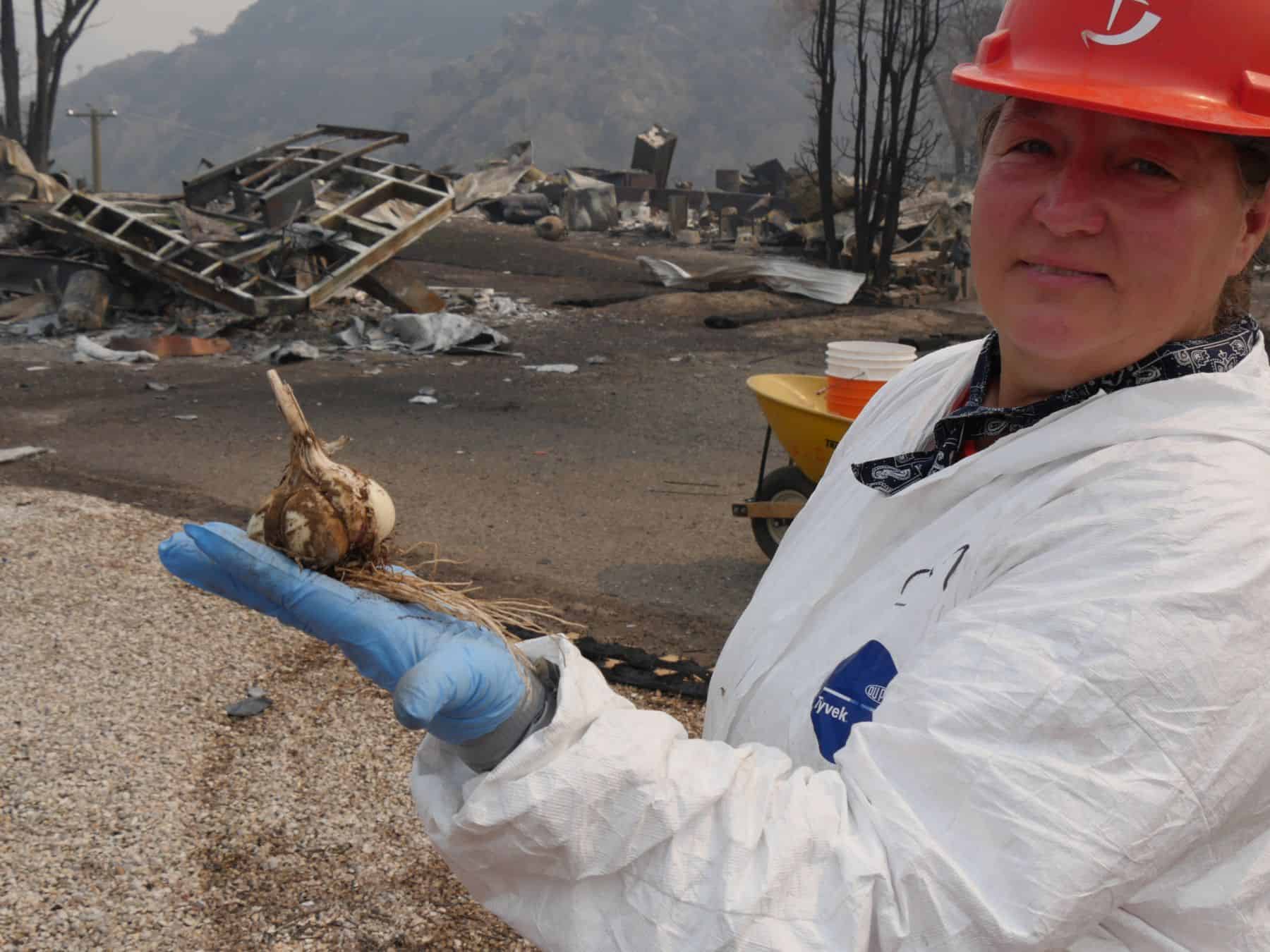
His prized Russian garlic not only brings in a tidy income, but is also his pride and joy. The tops are charred beyond recognition, but the bulbs are intact.
As sifters do their work, he regales everyone around him with stories of prospecting for gold, hunting 2,000-pound walrus in the arctic and other wild, youthful adventures.
When asked how he is feeling seeing the ashes of his home, he says, “I can’t control what happens to me, but I can control how I react to it. That’s what character is. I’m looking forward. Also, there was a big pile of dirty dishes in the sink that I don’t have to do now!”
Laughing in the midst of total destruction feels good. It’s defiant. It helps us remember that God is bigger than this.
Doug gratefully receives the signed Bible presented to him by the chaplains and says he is going to make an effort to spend time reading it. Doug is planning to rebuild as soon as he is allowed to do so.
God’s mercies are new every morning
After volunteers tidy up the work site and drive back to the church to hit the shower trailer, everyone chatters about their day.

We arrive to a hot meal of sweet and sour chicken organized by local church members. They serve us buffet style.
Everyone gushes over the home-made brownies and ice cream, and most sneak seconds.
During the evening debriefings, everyone is free to share what is on their hearts. This is often when the tears come—joy, deep sorrow, appreciation, exhaustion, exhilaration all intermingle and spill out.
We pray.
Spent and filled, we drift into quiet conversations and makeshift bed time routines. Tomorrow is another day.
God’s mercies are new each morning.


